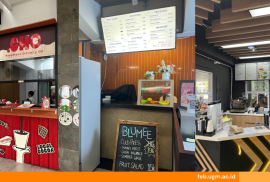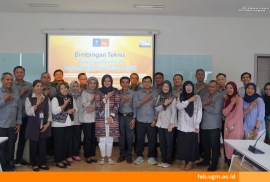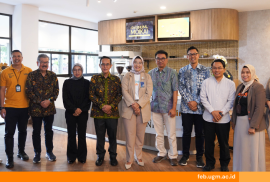The Chairman of the Indonesian Chamber of Commerce and Industry (KADIN), Mohammad Arsjad Rasjid Prabu Mangkuningrat, emphasized the need to develop quality human resources. This effort is essential to support the achievement of the 8% economic growth target through increased productivity and competitiveness.
Arsjad delivered this message during the Highlight Seminar of the 19th FSDE entitled “Fostering Human Capital Development: A Way for Developing Countries to Level Up, which was held on Saturday, October 2, at the Sukadji Ranuwihardjo MM FEB UGM Auditorium. The Economics Student Association (HIMIESPA FEB UGM) organized the seminar.
Arsjad used Singapore, a developed country in ASEAN, as an example. He said Singapore has become a developed country because it has quality human resources. Known as the “Home of The Best Talents,” the Singaporean government has invested heavily in primary education, vocational schools, and technical education. This massive investment in education is also supported by export-led industrialization and its strategic position as a global hub for trade, finance, and technology.
“Human resources are a country’s greatest asset. So, how do we achieve the future world we dream of? The way is by working together, not only the government, but all of us, the people,” he said.
Meanwhile, BAPPENAS RI’s Deputy for Human and Cultural Development, Dr. Amich Alhumami, emphasized the importance of investing in education and health care. According to him, these two areas have a reciprocal relationship that strengthens each other. Investments in education will produce parents with good health literacy, leading to a new, educated, healthy generation. Conversely, investments in health care will prepare a younger generation with good health and proper nutrition. Contributions from both sectors can improve Indonesia’s productivity and the quality of its human resources.
“Investment is critical, starting with early childhood education and the prenatal phase (in the womb), because proper nutrition in the first 1,000 days of life can affect a child’s cognitive development in the future. Addressing health issues will also affect their education,” Amich explained.
After the presentations by the two keynote speakers, a panel discussion was held with three speakers from different fields. First, the Director and Founder of CELIOS (Center of Economic and Law Studies), Bhima Yudhistira Adhinegara, discussed the challenges that job seekers currently face due to the formalization of work and the adoption of policies that harm workers. Bhima also highlighted Indonesia’s over-reliance on extractive sectors such as mining and plantations, which threaten the country’s environmental sustainability. Bhima proposed a solution through a community-based renewable energy economic model to address this issue.
Amanda McLoughlin OBE, Development Director for Indonesia and Minister Counsellor for Development at UKMis ASEAN, then spoke about the diplomatic relationship between Indonesia and the UK, focusing on society. Amanda highlighted the UK’s mission to help Indonesia achieve inclusive and sustainable economic growth, mainly through transforming education and healthcare.
Finally, Reza Anglingkusumo, Ph.D., Principal Country Economist at the Indonesia Resident Mission of ADB’s Asia Department, said that Indonesia’s ability to become a high-income country depends mainly on the quality of its human resources. The government can improve the quality of human resources through policies and regulations such as modern curricula, expanded access to vocational and technical schools, online education, and social protection programs.
“Human resources play a critical role in economic growth. High-quality human resources can lead to high productivity and generate positive externalities in other sectors,” Reza concluded.
Reportage: Najwah Ariella Puteri
Editor: Kurnia Ekaptiningrum
Sustainable Development Goals












